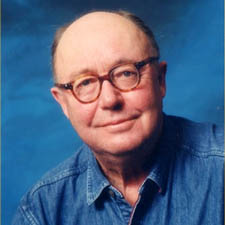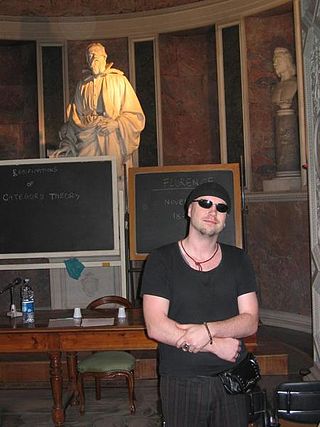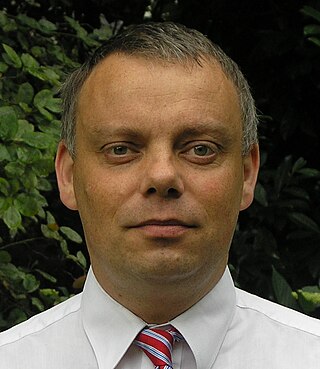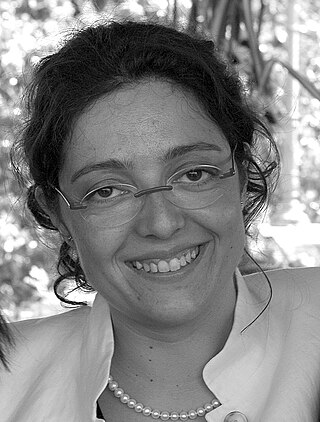
Andrew Stuart Tanenbaum, sometimes referred to by the handle AST, is an American computer scientist and professor emeritus of computer science at the Vrije Universiteit Amsterdam in the Netherlands.
Theoretical computer science is a subfield of computer science and mathematics that focuses on the abstract and mathematical foundations of computation.
The Centrum Wiskunde & Informatica is a research centre in the field of mathematics and theoretical computer science. It is part of the institutes organization of the Dutch Research Council (NWO) and is located at the Amsterdam Science Park. This institute is famous as the creation site of the programming language Python. It was a founding member of the European Research Consortium for Informatics and Mathematics (ERCIM).

Jack Joseph Dongarra is an American computer scientist and mathematician. He is a University Distinguished Professor Emeritus of Computer Science in the Electrical Engineering and Computer Science Department at the University of Tennessee. He holds the position of a Distinguished Research Staff member in the Computer Science and Mathematics Division at Oak Ridge National Laboratory, Turing Fellowship in the School of Mathematics at the University of Manchester, and is an adjunct professor and teacher in the Computer Science Department at Rice University. He served as a faculty fellow at the Texas A&M University Institute for Advanced Study (2014–2018). Dongarra is the founding director of the Innovative Computing Laboratory at the University of Tennessee. He was the recipient of the Turing Award in 2021.
Computational science, also known as scientific computing, technical computing or scientific computation (SC), is a division of science that uses advanced computing capabilities to understand and solve complex physical problems. This includes
Johannes Aldert "Jan" Bergstra is a Dutch computer scientist. His work has focussed on logic and the theoretical foundations of software engineering, especially on formal methods for system design. He is best known as an expert on algebraic methods for the specification of data and computational processes in general.

Henri Elle Bal is a professor of computer science at the Vrije Universiteit, Amsterdam in the Netherlands. He is a well-known researcher in computer systems with a specialization in parallel computer systems, languages, and applications.

Roger Michael Needham was a British computer scientist.
Jan Willem Klop is a professor of applied logic at Vrije Universiteit in Amsterdam. He holds a Ph.D. in mathematical logic from Utrecht University. Klop is known for his work on the algebra of communicating processes, co-author of TeReSe and his fixed point combinator

Bob Coecke is a Belgian theoretical physicist and logician who was professor of Quantum foundations, Logics and Structures at Oxford University until 2020, when he became Chief Scientist of Cambridge Quantum Computing, and after the merger with Honeywell Quantum Systems, Chief Scientist of Quantinuum. In January 2023 he also became Distinguished Visiting Research Chair at the Perimeter Institute for Theoretical Physics. He pioneered categorical quantum mechanics, Quantum Picturalism, ZX-calculus, DisCoCat model for natural language, and quantum natural language processing (QNLP). He is a founder of the Quantum Physics and Logic community and conference series, and of the applied category theory community, conference series, and diamond-open-access journal Compositionality.
Johannes Cornelis (Hans) van Vliet is a Dutch computer scientist and Professor Emeritus of Software Engineering at the Vrije Universiteit Amsterdam, known for his work in quantitative aspects of software engineering.
Roelf Johannes (Roel) Wieringa is a Dutch computer scientist who was a professor of Information Systems at the University of Twente, specialized in the "integration of formal and informal specification and design techniques".
Harm Bart is a Dutch mathematician, economist, and Professor of Mathematics at the Erasmus University Rotterdam, particularly known for his work on "factorization problems for matrix and operator functions."

Jan Friso Groote is a Dutch computer scientist.
The Korteweg-de Vries Institute for Mathematics (KdVI) is the institute for mathematical research at the University of Amsterdam. The KdVI is located in Amsterdam at the Amsterdam Science Park.

Sara Lombardo is an Italian applied mathematician whose research topics include nonlinear dynamics, rogue waves and solitons, integrable systems, and automorphic Lie algebras. She is Executive Dean of the School of Mathematical & Computer Sciences at Heriot-Watt University. Previously she was professor of mathematics at Loughborough University, and associate dean with teaching responsibilities.
Gerrit van der Mey was a deafblind Dutch mathematician. He helped create software for PTERA and ZEBRA, some of the first computers designed in the Netherlands, as well as creating compilers for later computers. In 1982 he was made a member of the Order of Orange-Nassau at the grade of knight.
Jacobus Willem (Jaco) de Bakker was a Dutch theoretical computer scientist and professor at the Vrije Universiteit Amsterdam.
Rena Bakhshi is a Dutch computer scientist and mathematician and programme manager for the Netherlands eScience Center's natural sciences and engineering domain.







